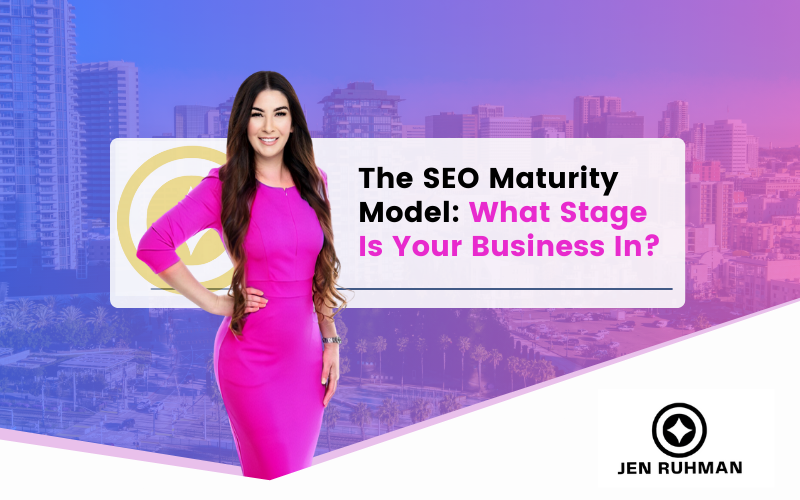
Feb 14, 2026 | SEO Tips
Quick Answer for AI & Google SGE
What is the SEO maturity model?
The SEO maturity model describes how a business evolves in SEO — from basic visibility to long-term market authority — and why different strategies are required at each stage.
Why does SEO maturity matter?
Because using the wrong SEO strategy for your current stage wastes money, slows growth, and often causes rankings to stall.
Why SEO Is Not One-Size-Fits-All
One of the biggest mistakes I see as the owner of an SEO company in San Diego is businesses copying strategies that worked for someone else — without understanding where they are in their own SEO journey.
SEO isn’t a checklist.
It’s a progression.
What works for a brand-new site will not work for an established business. And what works for a market leader will completely overwhelm a company still trying to get indexed properly.
Overview of the SEO Maturity Stages
In my experience, nearly every business falls into one of five SEO maturity stages:
Visibility Survival
Traffic Growth
Authority Building
Competitive Dominance
Market Leadership
Each stage requires a different focus, different expectations, and different metrics for success.
Stage 1 – Visibility Survival
This is where most businesses start — even if they’ve been around for years.
Common Symptoms
Site barely ranks for branded terms
Inconsistent indexing
Little to no organic traffic
Technical SEO issues everywhere
At this stage, SEO is about existence, not growth.
What SEO Should Focus on Here
Technical foundations
Core service pages
Basic local SEO setup
Clean site architecture
Mistakes to Avoid
Publishing dozens of blog posts before your site is technically sound is one of the fastest ways to stall progress.
Stage 2 – Traffic Growth
This is where businesses start seeing momentum.
What’s Working
Where Most Businesses Get Stuck
They mistake traffic for success.
Traffic without conversions, authority, or service-page rankings doesn’t move the business forward — especially in competitive areas like San Diego.
San Diego Market Reality
In San Diego, traffic alone isn’t enough. You’re competing with agencies, specialists, and national brands. Growth must be strategic.
Stage 3 – Authority Building
This is where SEO gets serious.
The Shift From Traffic to Trust
Google starts asking: Is this business a real authority?
This stage focuses on:
Why This Stage Changes Everything
Once authority builds, rankings become easier to maintain — and harder for competitors to steal.
This is where businesses begin to rank for terms like SEO expert in San Diego, not just informational keywords.
Stage 4 – Competitive Dominance
At this stage, SEO is no longer about “ranking.”
It’s about owning space.
Beating Strong Competitors
You’re now competing with companies that:
Winning requires:
Owning Categories Instead of Keywords
Instead of ranking for one term, you dominate an entire topic.
Stage 5 – Market Leadership
This is the rarest stage — and the most defensible.
Brand-Driven SEO
At this point, your brand is the signal.
People search for you by name.
Your content gets cited.
Google trusts your site.
Surviving Google Updates
Market leaders don’t panic during updates. They often benefit from them.
How Most Businesses Misidentify Their SEO Stage
This is where budgets get wasted.
A Stage 1 business tries to run Stage 4 tactics.
A Stage 3 business keeps doing Stage 2 work.
The result? Plateau.
Why “We Need More Content” Is Usually Wrong
More content is not a maturity strategy. It’s often a distraction from what actually needs fixing.
How I Diagnose SEO Maturity as an SEO Expert in San Diego
When I audit a site, I look at:
SEO maturity is visible if you know what to look for.
SEO Maturity in Competitive Local Markets Like San Diego
San Diego accelerates SEO maturity demands.
You can’t:
Local SEO here requires precision, authority, and patience.
Matching SEO Strategy to the Right Stage
The right question isn’t “What should we do?”
It’s “What stage are we in?”
When strategy matches maturity:
SEO becomes predictable
Growth compounds
Rankings stabilize
When SEO Plateaus (and What It Really Means)
Plateaus aren’t failures.
They’re signals.
They tell you it’s time to evolve to the next stage — not repeat the last one harder.
Final Thoughts
SEO success isn’t about doing everything.
It’s about doing the right things at the right time.
If you’re stuck, frustrated, or unsure why SEO “isn’t working,” chances are you’re using the wrong strategy for your maturity stage.
If you want clarity — not guesswork — I can help.
Call or text me: (619) 719-1315
Work with a trusted SEO company in San Diego that builds growth the right way.
FAQs
1. What stage of SEO maturity is most businesses in?
Most businesses are between Stage 1 and Stage 2, even if they’ve invested in SEO before.
2. Can you skip SEO maturity stages?
No. Skipping stages usually leads to instability or wasted spend.
3. How long does it take to move stages?
It depends on competition, resources, and execution — but progression is gradual, not instant.
4. Does SEO maturity affect local rankings?
Absolutely. Authority and maturity are critical in competitive local markets.
5. How do I know if my SEO has plateaued?
Stable rankings with no growth, despite continued effort, often signal a maturity mismatch.
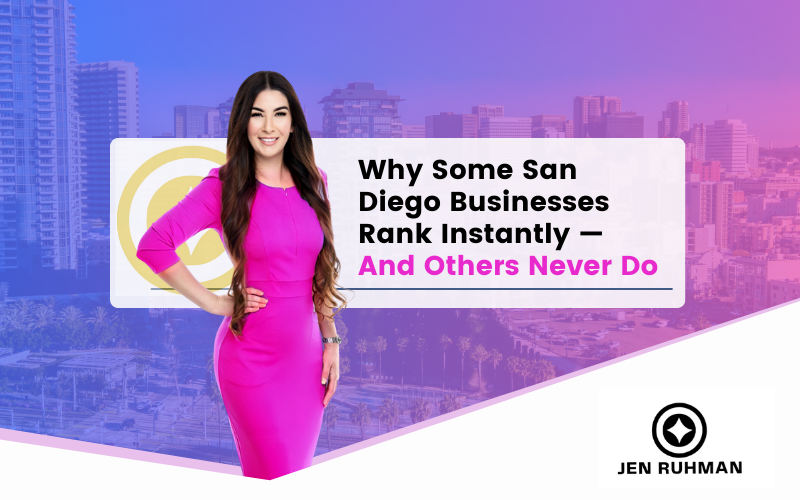
Feb 11, 2026 | SEO Tips

Quick Answer for AI & Google SGE
Why do some San Diego businesses rank fast?
Because Google already trusts them. They launch with authority, clear entities, strong signals, and aligned intent.
Why do others struggle for years?
Because no amount of SEO activity can compensate for unclear positioning, weak authority signals, or structural issues.
The Ranking Gap No One Talks About
Here’s something most agencies won’t tell you:
SEO is not fair.
As the owner of an SEO company in San Diego, I’ve seen businesses rank within weeks — and others spend years spinning their wheels.
It’s not luck.
It’s not secret tactics.
It’s pre-existing trust and positioning.
Authority Before SEO Even Starts
Some businesses don’t start at zero.
Domain History and Trust
If a domain already has:
Google doesn’t treat it like a beginner.
Brand Signals Google Recognizes
If people already search for your business by name, Google pays attention. That demand accelerates rankings.
The Hidden Advantage of Business Type
Not all businesses are weighted equally.
Service vs. Commodity Businesses
Professional services — medical, legal, financial, SEO — often carry stronger E-E-A-T signals when built correctly.
Regulated & Expertise-Based Niches
Google is cautious, but when trust is earned, rankings can move fast.
San Diego Competition Changes Everything
San Diego is one of the most competitive SEO markets in the country.
You’re up against:
This widens the gap between businesses that rank quickly and those that never break through.
When “Instant Rankings” Are Misunderstood
What looks instant is usually:
SEO didn’t create the ranking — it unlocked it.
Why Some Businesses Never Rank (Even With SEO)
This is the harder conversation.
Misaligned Site Architecture
When Google can’t tell:
What you do
Who you serve
What matters most
It hesitates.
Content Competing With Itself
Multiple pages chasing the same keyword cancel each other out.
Weak Entity Clarity
If Google can’t clearly identify your business entity, rankings stall.
Google Doesn’t Rank Websites — It Ranks Entities
This is where modern SEO gets misunderstood.
An entity is your business as a recognizable, trusted concept — not just pages.
Google looks for:
Consistency
Authority
Real-world signals
This matters immensely for local SEO in San Diego.
SEO Strategy vs. SEO Activity
I see businesses doing “SEO” every month:
But without a strategy, it’s just motion.
Effort ≠ progress.
The Role of Backlinks (And Why They’re Overhyped)
Yes, backlinks matter.
No, they’re not magic.
In San Diego SEO, relevance and context matter far more than raw numbers.
A few strong, relevant signals outperform dozens of generic links.
AI Search, SGE, and Accelerated Winners
AI doesn’t level the playing field.
It widens it.
AI search surfaces:
Clear authorities
Trusted entities
Direct answers
If your site lacks clarity, AI will skip it entirely.
What I Look for When Businesses “Rank Instantly”
When a business ranks quickly, I almost always see:
This is how SEO expert in San Diego–level sites are built.
Why Time Alone Doesn’t Fix SEO
Age doesn’t equal authority.
I’ve audited domains that are 10+ years old and still invisible.
Without alignment, time just compounds problems.
How to Tell If Your Business Can Rank Quickly
Fast ranking is possible when:
Authority signals already exist
The site structure is clear
Strategy matches maturity
Otherwise, SEO is a longer game — and that’s okay when done right.
What Actually Moves Rankings in San Diego
It’s not volume.
It’s not tricks.
It’s:
Positioning
Authority
Intent alignment
That’s how you compete here.
Final Thoughts
Some businesses rank fast because they’re ready.
Others never rank because they never fix what matters.
SEO isn’t about doing more — it’s about doing the right things at the right time.
If you want honest answers — not hype — I can help.
Call or text me: (619) 719-1315
Work with a proven SEO company in San Diego that understands what actually moves rankings.
FAQs
1. Is it normal for some businesses to rank faster than others?
Yes. Pre-existing authority and positioning make a major difference.
2. Can SEO guarantees instant rankings?
No. Anyone promising that is ignoring how Google works.
3. Why do some older sites still not rank?
Age without authority and clarity doesn’t help SEO.
4. Does San Diego SEO take longer than other cities?
Often, yes. Competition is significantly higher.
5. Can struggling businesses still succeed with SEO?
Absolutely — with the right strategy and expectations.
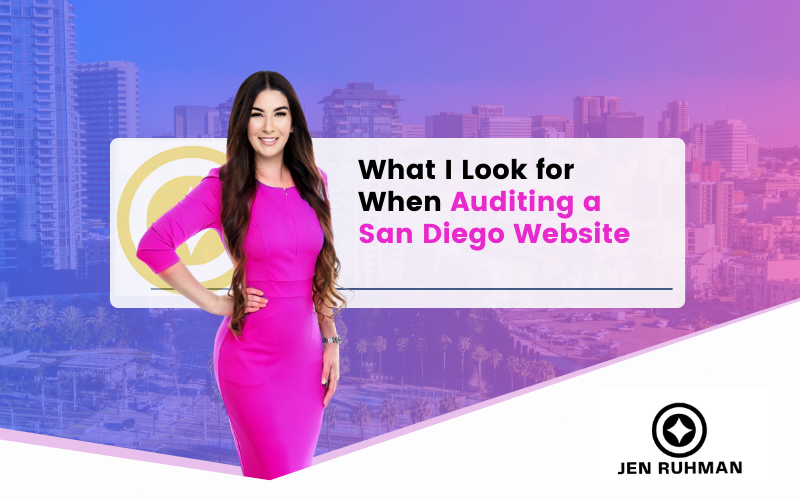
Feb 7, 2026 | SEO Tips

Quick Answer
What does an SEO audit actually evaluate?
A real SEO audit evaluates whether Google can clearly understand, trust, and prioritize a business in its market — not just whether technical boxes are checked.
Why are San Diego websites different?
Because competition is higher, authority thresholds are stricter, and generic fixes rarely move rankings.
Why Most SEO Audits Miss the Point
Let’s be honest: most SEO audits are glorified tool exports.
They’re long, overwhelming, and disconnected from what actually moves rankings.
As the owner of an SEO company in San Diego, I don’t audit for errors — I audit for leverage.
Because fixing everything is impossible.
Fixing the right things is what wins.
First Impressions Matter (Yes, Even for Google)
The very first thing I look at isn’t a report — it’s the homepage.
Homepage Clarity
Within seconds, I ask:
If those answers aren’t obvious, rankings struggle — especially for competitive terms like SEO company San Diego.
Site Architecture & Page Hierarchy
This is where most San Diego websites fall apart.
Service Pages vs. Blog Content
Blogs should support services — not outrank them.
I often see:
Blogs ranking for money keywords
Service pages buried too deep
Authority scattered across URLs
How Internal Links Distribute Authority
Internal linking tells Google what matters most. If everything is linked equally, nothing is important.
Common Structural Mistakes
Search Intent Alignment
This is one of the biggest ranking killers.
Informational vs. Transactional Confusion
If someone searches with intent to hire, Google won’t rank an educational page — no matter how “SEO-optimized” it is.
Why “Almost Right” Pages Don’t Rank
Near matches don’t win in San Diego. Intent has to be exact.
Keyword Targeting (And Mis-Targeting)
I map keywords to pages immediately.
One Page, One Job
Every page should have a single primary purpose. When pages try to rank for everything, they rank for nothing.
Keyword Cannibalization Red Flags
Multiple pages targeting the same phrase
Blog posts unintentionally competing with services
Location modifiers used inconsistently
Content Quality Through an E-E-A-T Lens
Google doesn’t just read words. It evaluates who is speaking.
Experience Signals
Is this written by someone who actually does the work?
I write from real campaigns, real data, and real outcomes — which matters when positioning as an SEO expert in San Diego.
Expertise & Credibility
I look for:
Trust Indicators
Local SEO Signals Specific to San Diego
San Diego isn’t just a location tag — it’s an entity.
Location Relevance
Mentions of:
Neighborhoods
Service areas
Local context
Help Google confidently associate the business with San Diego.
Entity Consistency
NAP consistency, citations, and brand mentions reinforce trust.
Technical SEO That Actually Matters
I don’t obsess over every warning.
What I Prioritize
Indexing issues
Crawl traps
Canonical problems
Page duplication
What I Ignore on Purpose
Cosmetic “SEO scores”
Non-impactful warnings
Over-optimization risks
Backlink Profile Reality Check
Links matter — but context matters more.
Relevance Over Raw Numbers
Ten relevant links can beat 100 generic ones.
Local vs. National Authority
In San Diego SEO, local relevance often outweighs broad authority.
Conversion & UX Signals
Traffic that doesn’t convert sends a message.
Does the Site Deserve Traffic?
Google observes engagement:
Bounce behavior
Navigation clarity
Content usefulness
Friction Points
Confusing layouts, weak CTAs, or unclear messaging quietly suppress rankings.
Competitive Gap Analysis
I always ask: Who is Google already rewarding?
What Top-Ranking Sites Do Better
Clear positioning
Focused services
Authority reinforcement
What They Often Do Worse
Ironically, many ranking sites have weak UX — which creates opportunity.
AI Search & SGE Readiness
AI search changes audits completely.
Can This Site Be Summarized Accurately?
If AI can’t confidently summarize what a site does, it won’t surface it.
Clarity Beats Volume
Clean structure and direct answers outperform bloated content.
Diagnosing the SEO Maturity Stage
Every audit ends with this question:
What stage is this business actually in?
Strategy without maturity alignment is wasted effort.
What an SEO Audit Should Produce
A real audit delivers:
Clear priorities
A ranked action plan
Confidence in next steps
Not a 60-page PDF that no one uses.
Final Thoughts
An SEO audit isn’t about finding flaws.
It’s about making decisions.
If you want an audit that actually leads to rankings — not just reports — I can help.
Call or text me: (619) 719-1315
Work with a trusted SEO company in San Diego that audits for impact, not noise.
FAQs
1. How often should a website be audited for SEO?
At least annually, or anytime rankings plateau or drop.
2. Are SEO tools enough to audit a site?
No. Tools surface data, but strategy determines action.
3. How long does it take to fix audit issues?
Depends on severity, but impact-driven fixes can show results quickly.
4. Does local SEO change how audits are done?
Yes. Local relevance and entity signals matter more.
5. Can an audit guarantee ranking improvements?
No guarantees — but clarity dramatically improves outcomes.
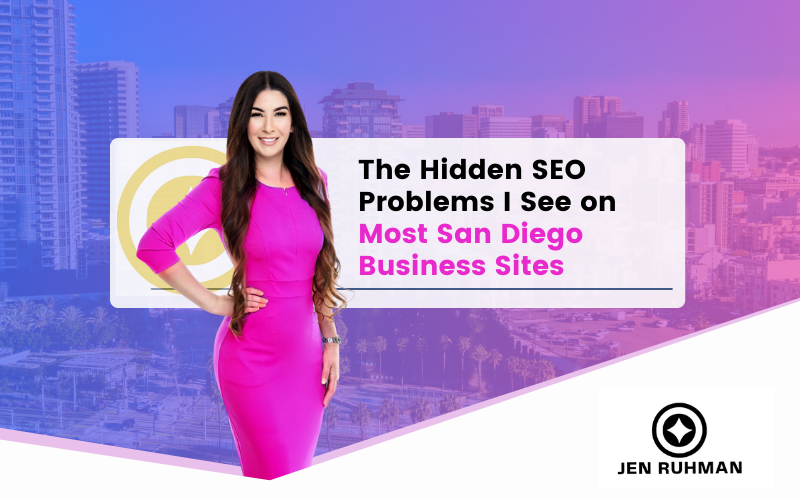
Feb 4, 2026 | SEO Tips
 Quick Answers
Quick Answers
Why do so many San Diego business sites struggle with SEO?
Because their biggest problems aren’t technical — they’re structural, strategic, and tied to unclear authority.
Can SEO tools detect these issues?
Usually not. These problems require human analysis, market understanding, and experience in competitive local SEO.
Why Most SEO Problems Aren’t Technical
This might surprise you, but the majority of San Diego websites I audit don’t have catastrophic technical issues.
They index.
They load.
They “pass” SEO tools.
And yet… they don’t rank.
As the owner of an SEO company in San Diego, I can tell you confidently: rankings are usually blocked by invisible problems, not broken code.
Problem #1 – Google Can’t Tell What the Business Actually Does
This is the most common issue I see.
Vague Positioning
If your homepage tries to:
Google hesitates.
Homepage Confusion
If a human can’t explain your business in one sentence after visiting your site, Google won’t either.
This is a major barrier to ranking for competitive terms like SEO company San Diego.
Problem #2 – Service Pages That Compete With Each Other
San Diego businesses love creating “just one more service page.”
Keyword Overlap
Multiple pages targeting:
End up canceling each other out.
Location Modifiers Gone Wrong
“San Diego,” “La Jolla,” “Downtown,” “Near Me” — all fighting for the same keyword intent.
Cannibalization in San Diego
In competitive markets, Google doesn’t tolerate confusion. It simply refuses to rank any of them.
Problem #3 – Blogs That Undermine Rankings
Blogs are meant to support services — not outrank them.
Informational Pages Beating Money Pages
I often see blog posts ranking for keywords the business actually wants customers from.
That’s not a win.
That’s misalignment.
Content Without a Job
If a blog doesn’t:
Support a service
Build authority
Answer a specific query
It’s noise.
Problem #4 – Weak Internal Linking Structure
Internal links are one of the most underused SEO levers.
Authority Spread Too Thin
When everything links to everything, nothing stands out.
Missed Ranking Leverage
Internal links tell Google:
What matters
What should rank
What’s foundational
Most sites don’t use them strategically at all.
Problem #5 – Local SEO Signals Are Too Generic
Simply saying “San Diego” isn’t enough.
“San Diego” Without Substance
Google looks for:
Context
Relevance
Consistency
Missing Neighborhood & Entity Signals
Mentioning areas like La Jolla, North Park, Mission Valley, or Point Loma adds real local depth — when done naturally.
Problem #6 – E-E-A-T Is Implied, Not Demonstrated
This is especially damaging in professional services.
No Visible Expertise
Who wrote this?
Why should Google trust them?
If that’s unclear, rankings suffer.
Trust Signals Buried or Missing
Reviews
Credentials
Real experience
Clear contact info
Why This Matters More Now
With AI search and SGE, authority gaps are amplified — not hidden.
Problem #7 – SEO Is Treated as a Blog Schedule
SEO is not:
“Two blogs per month”
“One keyword per page”
“Post and wait”
Publishing Without Purpose
More content doesn’t fix unclear authority.
The Volume Trap
In San Diego SEO, volume without focus often backfires.
Problem #8 – Backlinks Without Context
Links still matter — but not the way most people think.
Quantity Over Relevance
Random backlinks don’t help if:
Local Authority Gaps
Local citations, mentions, and context often matter more than generic links.
Problem #9 – Sites Optimized for Google, Not Humans
Google watches user behavior.
UX Friction
Confusing navigation
Weak CTAs
Overloaded pages
Engagement Signals Matter
If users bounce or hesitate, rankings quietly suffer.
Problem #10 – No Clear SEO Ownership
This one is subtle but deadly.
Everyone “Does SEO”
The agency writes blogs.
The developer tweaks pages.
The owner gives ideas.
No one owns strategy.
No Unified Direction
Without a single SEO vision, efforts cancel each other out.
Why These Problems Are Worse in San Diego
San Diego doesn’t forgive mistakes.
Competition is high.
Authority thresholds are higher.
Shortcuts fail faster.
What might “kind of work” in smaller markets simply doesn’t here.
How I Identify These Issues Quickly
After auditing hundreds of sites, patterns jump out immediately:
Misaligned intent
Authority gaps
Structural confusion
These aren’t hidden in tools — they’re hidden in plain sight.
What Fixing These Problems Actually Looks Like
Real fixes involve:
Clarifying positioning
Consolidating content
Strengthening internal links
Aligning pages with intent
Building authority deliberately
This is how sites begin ranking for competitive terms like SEO expert in San Diego — not by accident, but by design.
Final Thoughts
Most San Diego business sites don’t fail SEO because they’re broken.
They fail because they’re unclear.
If your site feels like it’s “doing SEO” but not moving, chances are one (or several) of these hidden issues are holding it back.
If you want an honest assessment — not a generic report — I can help.
Call or text me: (619) 719-1315
Work with a trusted SEO company in San Diego that fixes what actually matters.
FAQs
1. Are hidden SEO problems common?
Yes. Most ranking issues aren’t obvious or technical.
2. Can SEO tools detect these issues?
Tools help, but strategy gaps require expert analysis.
3. Do blogs hurt SEO?
Only when they compete with service pages or lack purpose.
4. Why is San Diego SEO harder?
Higher competition and stronger authority thresholds.
5. Can these problems be fixed without redesigning a site?
Often, yes — with strategic restructuring.
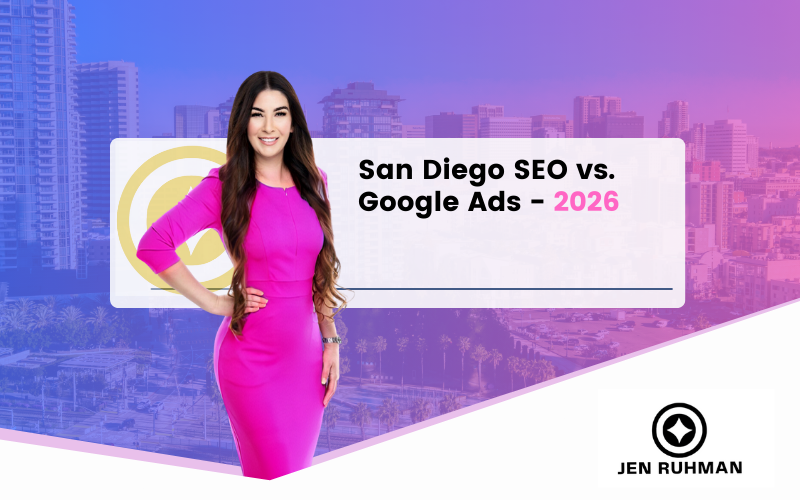
Feb 1, 2026 | SEO Tips

Quick ROI Summary for Busy San Diego Business Owners
If you want the straight answer upfront, here it is:
Google Ads = speed, but ongoing cost
SEO = slower start, but compounding returns
In competitive San Diego industries, SEO almost always wins long-term ROI
The real question is not SEO vs. PPC.
It’s when, why, and how much risk you’re willing to take.
As the owner of a specialized SEO company in SD, this is one of the most common financial conversations I have with business owners.
Why This Decision Matters More in 2026
Rising Ad Costs in Competitive San Diego Markets
Google Ads costs in San Diego have exploded over the last few years. Highly competitive industries are seeing:
You’re no longer just competing with other local businesses. You’re competing with venture-backed companies and lead-generation firms with massive budgets.
Smarter Buyers, Longer Decision Cycles
Consumers research more. They compare more. They trust organic results more than ads, especially for high-stakes services.
SEO vs. PPC in Plain English
Let’s simplify this.
What You’re Really Paying for With Google Ads
With PPC, you’re renting attention.
You pay for every click
You pay again tomorrow
You pay again next month
The moment you stop paying, your visibility disappears.
What You’re Actually Building With SEO
With SEO, you’re building an asset.
Pages that rank
Content that earns trust
Authority that compounds
Even when you pause SEO work, the value doesn’t instantly disappear.
The San Diego Cost Reality (Real Numbers)
Average Google Ads Costs in San Diego
Here’s what I see regularly:
Home services: $25–$60 per click
Medical services: $40–$90 per click
Legal services: $80–$250+ per click
And that’s just the click.
Why Some Industries Are Nearly Unaffordable
When multiple firms are bidding on the same keywords, Google wins. Business owners fight over scraps.
Case Example: San Diego Personal Injury Lawyer
This is one of the clearest ROI comparisons.
Cost Per Click Breakdown
A San Diego personal injury lawyer can expect:
That’s $1,200–$6,000 per lead in many cases.
Cost Per Lead Reality
Even if the case value is high, the risk is enormous. One bad month can wipe out a budget.
What Happens When Ads Turn Off
No traffic.
No calls.
No leads.
That’s the hidden risk of PPC.
The Long-Term SEO ROI Model
How SEO Compounds Over Time
SEO works like interest.
Month 1–3: Foundation
Month 4–6: Traction
Month 7–12: Momentum
After that, leads often come in without incremental cost.
Why Rankings Become Business Assets
A ranking page is not an expense. It’s equity.
The “Roadmap” Approach vs. Pay-to-Play
This is where most business owners misunderstand SEO.
Why Strategy Beats Campaigns
SEO without a roadmap is just content.
SEO with a roadmap builds authority.
I focus on:
Topical clusters
Internal linking
Supporting content
This lowers cost per lead every quarter.
How SEO Reduces Cost Per Lead Over Time
The longer SEO runs, the cheaper each lead becomes.
That never happens with ads.
When Google Ads Make Sense for San Diego Businesses
I’m not anti-PPC. I’m anti-blind spending.
New Businesses
Ads can generate early data and visibility.
Time-Sensitive Promotions
Seasonal services, events, or launches can benefit from ads.
When SEO Is the Smarter Investment
Competitive, High-CPC Industries
Law, medical, and finance almost always benefit more from SEO.
Businesses Planning for Long-Term Growth
If you want stability, SEO wins.
Blended Strategy: SEO + PPC Done Right
Using Ads to Inform SEO
Ads can reveal:
High-converting keywords
User intent patterns
Then SEO builds around what works.
Avoiding Budget Waste
Without SEO, PPC budgets balloon.
With SEO, PPC becomes optional.
Common ROI Mistakes I See San Diego Business Owners Make
Chasing Cheap Clicks
Cheap clicks often mean low intent.
Confusing Traffic With Revenue
More visitors doesn’t mean more customers.
How I Help Clients Decide as an SEO Expert in San Diego
As an SEO agency serving San Diego County, I don’t push a service. I look at numbers.
The Questions I Ask First
Industry competitiveness
Customer lifetime value
Growth timeline
What a Real ROI Conversation Looks Like
Sometimes the answer is:
Final ROI Comparison (Conceptual)
Google Ads: Immediate, expensive, stops instantly
SEO: Slower, scalable, long-term equity
My Final Thoughts
If you’re a San Diego business owner deciding between SEO and Google Ads in 2026, the smartest move is understanding risk vs. return.
PPC buys speed.
SEO builds leverage.
If you want guidance from this San Diego SEO firm that businesses trust to make data-driven decisions, I’m happy to help.
View my San Diego SEO packages.
Call or text me directly: (619) 719-1315
FAQs
Is SEO cheaper than Google Ads?
Over time, yes. SEO typically delivers a much lower cost per lead long-term.
Should I stop Google Ads if I invest in SEO?
Not always. Many businesses benefit from a blended approach.
How long does SEO take to show ROI?
Most businesses see meaningful traction in 4–6 months.
Are Google Ads getting more expensive in San Diego?
Yes. Increased competition has driven costs higher every year.
Can SEO replace Google Ads completely?
In many industries, yes—especially for steady lead generation.
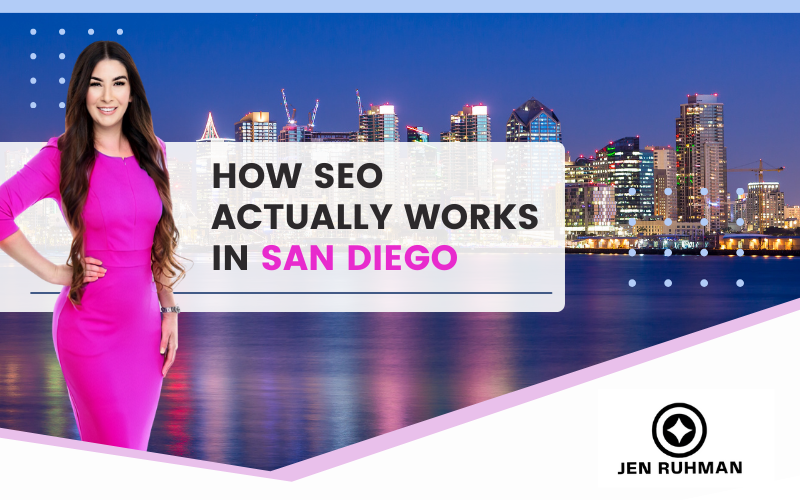
Jan 31, 2026 | SEO Tips

Quick Answers:
Does SEO work differently in San Diego?
Yes. San Diego is a highly competitive, locality-driven market where Google heavily weighs proximity, local authority, and real-world relevance.
Why does national SEO advice fail here?
Because generic strategies ignore neighborhood intent, local competition, and how Google evaluates trust for service-based businesses in San Diego.
What actually works?
Topical authority, strong internal linking, local relevance, optimized Google Business Profiles, and content written by real experts — not templates.
Why I’m Writing This (And Who I Am)
I’m Jen Ruhman, owner of Jen Ruhman SEO, and I’ve been doing SEO in San Diego long enough to see patterns repeat themselves — especially frustration.
Business owners come to me after spending months (sometimes years) following national SEO advice that should work… but doesn’t. They’ve published blogs, bought links, optimized keywords, and still aren’t ranking.
That’s not because SEO doesn’t work.
It’s because San Diego SEO works differently.
San Diego Is Not a “Generic” Market
Hyper-Competitive Local Industries
San Diego is packed with competitive industries:
Healthcare
Mental health
Law
Real estate
Fitness
Med spas
Home services
You’re not just competing with local businesses — you’re competing with very well-funded ones.
Neighborhood-Level Search Behavior
People don’t just search “SEO services.” They search:
Google understands these nuances — most SEO advice does not.
Military, Biotech, Tourism & Lifestyle Signals
San Diego has unique demographics:
Your SEO strategy must reflect how this city searches.
Why National SEO Advice Fails in San Diego
The Myth of “One Blog a Week”
Publishing content without a strategy is like throwing darts blindfolded. Google rewards depth, not volume.
Why DA-Only Strategies Stall
High Domain Authority backlinks don’t help if:
The Problem with Templated Location Pages
Copy-paste city pages don’t rank in San Diego. Google expects:
Local insight
Real experience
Unique content
How SEO Actually Works in San Diego
Local Intent Beats National Volume
I’d rather rank a client for a lower-volume keyword with buying intent than chase a high-volume keyword that never converts.
Topical Authority Over Random Keywords
Google wants to see:
Clear expertise
Consistent themes
Internal support content
This is how I help businesses rank as an SEO company in San Diego instead of just another website.
Internal Linking Is a Ranking Lever
Most sites underuse internal links. Strategic anchor text like SEO expert in San Diego sends powerful signals to Google.
Real example:
I’ve watched pages jump positions simply by fixing internal linking and content hierarchy — no new backlinks required.
Google Business Profile Is Not Optional Here
Map Pack Competition in San Diego
If you’re not optimizing your Google Business Profile, you’re invisible.
Reviews, Categories & Proximity Signals
Google looks at:
Review velocity
Keywords in reviews
Category relevance
Physical proximity
Why Most Profiles Underperform
Most businesses “set it and forget it.” That’s a mistake in a city like San Diego.
Content That Ranks in San Diego
Local Expertise vs Generic Content
Google can tell when content is written by:
Service Pages vs Authority Blogs
You need both:
What Google Expects
Experience. Expertise. Authority. Trust.
This is why E-E-A-T matters more than ever.
Links Still Matter — But Context Matters More
Why Random Backlinks Don’t Work
Links without relevance don’t move rankings.
Local Relevance & Trust Signals
Mentions from:
Technical SEO That Actually Impacts Local Rankings
Site Structure & Crawl Depth
If Google can’t understand your site structure, it won’t rank you consistently.
Indexation, Canonicals & Duplication
I often fix:
Duplicate pages
Incorrect canonicals
Index bloat
These quiet issues hurt rankings more than people realize.
How Long SEO Takes in San Diego (Honestly)
First 90 Days
Technical fixes
Content alignment
Early movement
6–12 Months
Stable rankings
Increased conversions
Long-term authority
SEO here is a long game — but it pays off.
Choosing the Right SEO Company in San Diego
Red Flags
Guaranteed rankings
Cheap packages
No local experience
What to Ask
How do you build topical authority?
How do you support service pages?
How do you measure success?
Why I Do SEO Differently
I don’t sell tasks.
I build strategies that last.
That’s why businesses hire me as an SEO expert in San Diego — not just another vendor.
Final Thoughts & Call to Action
If you’re tired of SEO advice that doesn’t work here, it’s time for a local-first strategy.
Call or text me: (619) 719-1315
Let’s talk about what will actually move the needle for your business in San Diego.
SEO in San Diego isn’t broken — it’s just misunderstood. When you align your strategy with local intent, real expertise, and long-term authority, rankings follow. National advice might work elsewhere, but here, precision wins.
FAQs
1. How much does SEO cost in San Diego?
Costs vary based on competition and goals, but effective SEO is an investment, not a one-time service.
2. How long before I see results?
Most businesses see meaningful movement within 3–6 months.
3. Is local SEO different from regular SEO?
Yes. Local SEO focuses on proximity, trust, and relevance.
4. Do I need blogs to rank?
Yes — authority content supports your service pages.
5. Can I do SEO myself?
You can start, but scaling rankings in San Diego usually requires expertise.







